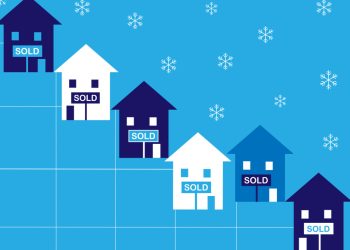As the coronavirus pandemic rapidly unfolds, the Federal Reserve cut interest rates Sunday toward zero, as well as announced emergency measures, including acquiring $700 billion in mortgage-backed securities and treasurys—two critical gears in the economic engine. The announcements join a litany of maneuvers the policymaker undertook this week, aimed at offsetting unprecedented volatility.
On a call on Sunday, Fed Chair Jerome Powell noted “the virus is having a profound effect,” and that the agency “expect to maintain the rate at this level until we’re confident that the economy has weathered recent events.” The Fed last lowered rates toward zero in the Great Recession.
With the decision on Sunday, the Fed has lowered rates twice, first on March 3 and again this past weekend, in response to the virus.
“This is an all-out measure to prevent a recession and fight the fear that is blanketing the country,” Lawrence Yun, chief economist at the National Association of REALTORS®, said in a statement. “It is the right policy, since the policy can easily be reversed should a vaccine be discovered or the virus goes away.”
Yun added that the fundamentals in the housing market remain solid, even as concerns of a downturn pile up.
“During the last recession, real estate was on wobbly ground with loose lending and too much supply,” said Yun. “Today, there is no subprime lending and too little supply. The real estate market will hold on much better.”
Despite emerging hesitation in the housing market, buyers have impossibly low mortgage rates, bolstering demand for home loans and refinances. According to a March 9 NAR survey, REALTORS® had not observed considerable impacts as a result of the virus, but, 16 percent cited a decline in homebuyer interest.
“The coronavirus is leading to fewer homebuyers searching in the marketplace, as well as some listings being delayed,” Yun said at the time. “Given that a home transaction is a major commitment, the uncertainties on how the economy will play out and the spread of the virus itself are barriers to home-buying and -selling.
“At the same time, the dramatic fall in interest rates may induce some potential buyers to take advantage of the better affordability conditions,” said Yun. “It is too early to assess the likely impact as to whether lower interest rates can overcome the economic and health anxieties.”
As of March 12, the average 30-year rate stabilized to 3.36 percent, Freddie Mac reported. Meanwhile, refinances surged, according to the latest Mortgage Bankers Association update, with MBA anticipating a continued deluge for the foreseeable future, as well as lower mortgage rates.
” dramatic action by the Fed…will significantly reduce stress in the system,” Mike Fratantoni, chief economist for MBA, said in a statement on Sunday. ” expect these actions will lower mortgage rates, helping homeowners save money through refinancing, and thereby providing a boost to the broader economy.”
In addition to lowering rates, the Fed announced impending plans to purchase securities, at least $200 billion in mortgage-backed securities and $500 billion in treasurys. On the call Sunday, Powell explained that “in the past week, several important financial markets, including the market for U.S. Treasury securities, have at times shown signs of stress,” and added “similar stresses have also emerged in the market for agency mortgage-backed securities, which is closely linked to the treasurys market and critically supports the ability for people to get a mortgage—to buy a house or refinance an existing mortgage.”
Beyond the cut and purchasing spree, the Fed also announced an effort to lower rates on swaps, in coordination with five banks overseas, “helping to mitigate the effects of…strains on the supply of credit to households and businesses,” according to the announcement by the policymaker.
As the coronavirus disrupts the economy and everyday life, analysts are quickly swiveling. Fannie Mae researchers revised their economic forecast, amended to 1.8 percent growth this year, instead of 2.2 percent, and MBA changed its projections, doubling its expected refinance volume this year.
“The recent shocks to the global economy are unprecedented and have introduced immense uncertainty into our economic forecast,” Doug Duncan, chief economist at Fannie Mae, said in a statement. “While we are still projecting modest growth in the coming months, the impact of the coronavirus threatens the longest expansion in U.S. history.”
Amid endeavors to lessen market turmoil, the House of Representatives approved a bill that mandates, among its provisions, free testing with or without insurance, and paid sick time. At press time, the bill is pending Senate vote. There are other measures in play, as well, including an additional $750 billion proposed to assist with childcare, fund hospitals and more, and rumblings of a stimulus.
For consumers encountering difficulty making mortgage payments, the Federal Housing Finance Agency advises contacting your servicer to explore forbearance options. Quicken Loans, the biggest lender and a major servicer, is working to assist consumers and offer relief, stating “our No. 1 priority continues to be our clients and making the online mortgage process as clear and safe as possible to help provide some certainty in these uncertain times.
“We are following the processes outlined by Fannie Mae, Freddie Mac and Ginnie Mae to provide forbearance relief to those affected by COVID-19, and urge policymakers at the federal, state and local levels to act now to present options that allow mortgage servicers to help homeowners whose cash flow may be impaired by this unprecedented crisis.”
For REALTORS®, adherence to fair housing laws remains vital. NAR has issued recommendations for REALTORS®, as well as associations, which are continuously updated.
As the coronavirus and its impact on the industry unfold, RISMedia is providing resources and updates. Get the latest.
 Suzanne De Vita is RISMedia’s senior online editor. Email her your real estate news ideas at sdevita@rismedia.com.
Suzanne De Vita is RISMedia’s senior online editor. Email her your real estate news ideas at sdevita@rismedia.com.











